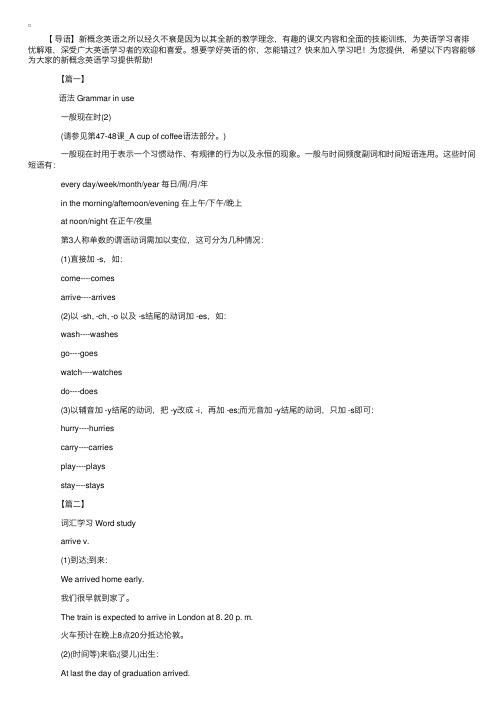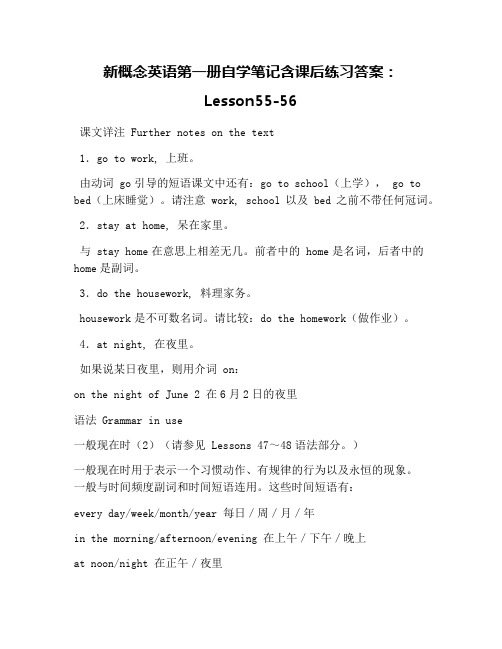新概念英语第一册Lesson55~60自学笔记精讲解析
新概念英语第一册第55课

Lesson 55: The Greenwood BoysLast week at a party, I met some friends of my sister's. They were charming boys from the south of England. One of them came up to me and asked me if I would like to go to the pictures with him and his friends. I was very happy to accept.They took me to a wonderful film at the local cinema. After the film, we went to a restaurant for dinner. We had a great time together. They were such nice boys!The next day, I received a telephone call from one of the boys. He asked me if I would like to join them on a small trip they were planning. I thought about it for a moment, and then I said yes.They told me that they were going to spend a few days in the country. They planned to stay in a small hotel outside the town. I was very excited about the trip.We set off early in the morning in two cars. It took us about an hour to reach the hotel. It was a lovely old building in a beautiful garden.In the afternoon, we went for a walk in the woods nearby. We saw some amazing birds and animals. In the evening, we played cards and talked together. It was a really enjoyable day.The next day, we went horse riding in the countryside. It was so much fun! We also visited a local farm and saw some cows and sheep.On the last day of our trip, we decided to go sailing on the lake near the hotel. It was a bit windy, but we still had a great time.When it was time to leave, we all got into our cars and drove back home. I had such a wonderful time with those charming boys from the south of England!。
新概念英语第一册 第55课笔记

新概念英语第一册第55课1.the +姓(复数) 表示一家人2.the Sawyer family=the Sawyers索耶一家3.the Black family=the Blacks布莱克一家live in 居住在+大地点live at 居住在+小地点go to work 去上班go to school去上学go to bed 去睡觉go home 回家take ---to ---带---去---stay in/at 呆在(大/小)do the homework/housework做作业/做家务at noon在中午see sb看望某人drink tea=have tea喝茶eat lunch=have lunch吃午饭come home from work下班回家come home from school放学回家after school放学after class下课after work下班arrive in/at到达(大/小)arrive home(省略介词) 到家at night在夜晚at noon在正午(中午12:00)at midnight在午夜(半夜12:00)read newspapers读报纸测试:表示一家人(两种表示)索耶一家(两个短语)布莱克一家(两个短语)居住在+大地点居住在+小地点去上班去上学去睡觉回家带---去---呆在(大/小)做作业/做家务在中午看望某人喝茶吃午饭下班回家放学回家放学下课下班到达(大/小)到家在夜晚在正午(中午12:00)在午夜(半夜12:00)读报纸。
新概念英语第一册 Lesson 55 知识点讲解讲义

LESSON 55【场景演练】生病看医生,怎么办?(2)(请结合第一册课本第62 课内容参考学习)【单词银行】1.medicine n.(吞服或液体的)药物中国传统医药,简称:中药:traditional Chinese medicinePlease take this medicine and stay in bed for 5 hours.另外,medicine 做不可数名词,指医学,疗法I am studying medicine.在英语的名词中,如果:身体的部位+ ache (疼、痛)= ...疼或痛头部head + ache = headache 头痛牙齿tooth + ache = toothache 牙痛脊背back + ache = backache 背痛耳朵ear + ache = earache 耳朵痛胃部stomach + ache = stomach ache 胃痛2.dentist n. 牙医注意词根词缀“-ist”,从事某种职业的人形容词dental 牙齿的,牙科的dentist 牙医【场景演练】生病看医生,怎么办?(2)艺术家art + ist = artist小说家novel (名词,小说)+ ist = novelist旅行家tour + ist = tourist钢琴家pian (o) + ist = pianist [ˈpɪənɪst]3.temperature ['temprətʃə(r)]n. 温度场景一:指气温The temperature is very high today.低的low场景二:体温His temperature is rising.She is running a temperature. 她正在发烧。
He has a temperature.I am going to take your child’s temperature.场景三:room temperature 室温(不冷也不热)You can eat this dish at room temperature.【经典句型】请熟悉如下的病情及方式描述:【场景演练】生病看医生,怎么办?(2)Tom has an earache. So he feels very bad.Lily drinks some cold water, so she has a stomach ache.His dad has flu, not bird flu.Her mum has a toothache and she can’t sleep in the night.Ricky has a headache, because this problem is a headache for him.Lucy has measles. Don’t talk with her please.Jimmy has mumps, so he looks very terrible.在以上的病症中,flu, mumps, measles, bird flu 都是不可数名词或词组,均有传染性,请注意,它们是否有冠词?而与ache 有关的痛,都是具体的某个部位的,请再观察是否有冠词?【场景补充】在国外看病,一般都需要提前预约。
裕兴新概念英语第一册笔记:Lessons55TheSawyerfamily

裕兴新概念英语第一册笔记:Lessons55TheSawyerfamilyLessons 55 The Sawyer familyNew words and expressions:live v.住,生活stay v. 呆在,停留home n. 家; adv.在家,到家housework n. 家务lunch n.午饭afternoon n.下午usually adv. 通常together adv. 一起evening n.晚上arrive v.到达night n.夜间live v.住,生活eg. Where do you live?你住在哪里?live in……后面接国家名称或城市名称eg. I live in England.eg. She lives in Shanghai.live at……后面接确切的地址eg. John lives at 66 King Street.stay v. 呆在,停留stay at home 呆在家里eg.My husband goes to work. I stay at home and look after the children.stay in 呆在家里不出去(尤其晚上呆在家里)eg. They always go out to the club at night, but I stay in and watch TV.stay with sb 和某人呆在一起eg. She stays with her children every night.eg. I like to stay with you.stay 是指临时,短时间居住。
stay at a hotel 住旅店stay at sb's house 住在别人的家live是指长久的居住,住在自己的家中eg. I live in an apartment. 我住在公寓里。
eg. I live in a house.home1) n.家eg. Welcome to my home.eg.My home is in Harbin.at home 在家eg. She always stays at home on weekends. make oneself at home 请随便一点,放松一点eg. Make yourself at home. 请随便一点。
新概念英语第一册:55-56课语法及单词解析

【导语】新概念英语之所以经久不衰是因为以其全新的教学理念,有趣的课⽂内容和全⾯的技能训练,为英语学习者排忧解难,深受⼴⼤英语学习者的欢迎和喜爱。
想要学好英语的你,怎能错过?快来加⼊学习吧!为您提供,希望以下内容能够为⼤家的新概念英语学习提供帮助!【篇⼀】语法 Grammar in use ⼀般现在时(2) (请参见第47-48课_A cup of coffee语法部分。
) ⼀般现在时⽤于表⽰⼀个习惯动作、有规律的⾏为以及永恒的现象。
⼀般与时间频度副词和时间短语连⽤。
这些时间短语有: every day/week/month/year 每⽇/周/⽉/年 in the morning/afternoon/evening 在上午/下午/晚上 at noon/night 在正午/夜⾥ 第3⼈称单数的谓语动词需加以变位,这可分为⼏种情况: (1)直接加 -s,如: come----comes arrive----arrives (2)以 -sh, -ch, -o 以及 -s结尾的动词加 -es,如: wash----washes go----goes watch----watches do----does (3)以辅⾳加 -y结尾的动词,把 -y改成 -i,再加 -es;⽽元⾳加 -y结尾的动词,只加 -s即可: hurry----hurries carry----carries play----plays stay----stays【篇⼆】 词汇学习 Word study arrive v. (1)到达;到来: We arrived home early. 我们很早就到家了。
The train is expected to arrive in London at 8. 20 p. m. ⽕车预计在晚上8点20分抵达伦敦。
(2)(时间等)来临;(婴⼉)出⽣: At last the day of graduation arrived. 毕业的那⼀天终于来临。
新概念英语第一册自学笔记含课后练习答案:Lesson55-56

新概念英语第一册自学笔记含课后练习答案:Lesson55-56课文详注 Further notes on the text1.go to work, 上班。
由动词 go引导的短语课文中还有:go to school(上学), go to bed(上床睡觉)。
请注意 work, school以及 bed之前不带任何冠词。
2.stay at home, 呆在家里。
与 stay home在意思上相差无几。
前者中的 home是名词,后者中的home是副词。
3.do the housework, 料理家务。
housework是不可数名词。
请比较:do the homework(做作业)。
4.at night, 在夜里。
如果说某日夜里,则用介词 on:on the night of June 2 在6月2日的夜里语法 Grammar in use一般现在时(2)(请参见 Lessons 47~48语法部分。
)一般现在时用于表示一个习惯动作、有规律的行为以及永恒的现象。
一般与时间频度副词和时间短语连用。
这些时间短语有:every day/week/month/year 每日/周/月/年in the morning/afternoon/evening 在上午/下午/晚上at noon/night 在正午/夜里第3人称单数的谓语动词需加以变位,这可分为几种情况:(1)直接加 -s,如:come----comesarrive----arrives(2)以 -sh, -ch, -o 以及 -s结尾的动词加 -es,如:wash----washesgo----goeswatch----watchesdo----does(3)以辅音加 -y结尾的动词,把 -y改成 -i,再加 -es;而元音加-y结尾的动词,只加 -s即可:hurry----hurriescarry----carriesplay----playsstay----stays词汇学习 Word study1.arrive v.(1)到达;到来:We arrived home early. 我们很早就到家了。
新概念英语第一册第55-56课:The Sawyer family

Lesson 55 The Sawyer family索耶一家人Listen to the tape then answer this question. When do the children do their homework?听录音,然后回答问题。
孩子们什么时候做功课?The Sawyers live at 87 King Street.索耶一家住在国王街87号。
In the morning, Mrs Sawyer goes to work and the children go to school.早上,索耶先生去上班,孩子们去上学。
Their father takes them to school every day.父亲每天送孩子们去上学。
Mrs Sawyer stays at home every day. She does the housework.索耶夫人每天呆在家里。
她料理家务。
She always eats her lunch at noon.她总是在正午吃午饭。
In the afternoon, she usually sees her friends. They often drink tea together.下午,她总是会见她的朋友。
她们经常在一起喝茶。
In the evening, the children come home from school. They arrive home early.傍晚,孩子们放学回家。
他们到家很早。
Mr Sawyer comes home from work. He arrives home late.索耶先生下班回家。
他到家很晚。
At night, the children always do their homework. Then they go to bed.晚上,孩子们总是做作业,然后去睡觉。
Mr Sawyer usually reads his newspaper, but sometimes he and his wife watch television.索耶先生总是读报纸,但有时和他的妻子一起看电视。
新概念英语第一册语法综述 55-60

新概念英语第一册语法综述(LESSON55-LESSON60)Part 11、Which season do you like best? 注意这个句子的结构,一般来说,除了频率副词之外,副词修饰动词时,应放在实义动词之后,如果有宾语的话,那么放在宾语的后面,如:My sister likes pop music best. 我妹妹最喜欢流行音乐。
同样的课文中:The sun rises early and2、early late 都可以做形容词。
You are early today. 你来的很早。
Don’t be late for school. 上学不要晚了3、The Sawyers live at 87 King Street.这句话中,姓氏前加The并加复数,代表索耶一家人,尤其是代表索耶夫妇俩。
而如果是具体的门牌号,要用介词at,否则用in,另外说地址要从小到大描述不能说King Street No.87。
在英文中表示“姓......的一家人”的方法有以下两种:<1>在表示姓氏的名词前面加上定冠词,后面加上family。
比如:the Lee family 姓李的一家人。
<2>在姓氏名词的复数形式前加上定冠词。
比如:the Lees 姓李的一家人。
The Sawyers live in King Street.4、Their fathers take them to school every day. take sb to place. 带某人去某地。
Sunday I take my children to zoo and watch the panda. 星期天,我带着孩子到动物园看熊猫。
The children come home from school. 孩子们从学校回到家。
注意from这个词,意思是“从…”。
It takes 30 minutes from home to the school. 从家到学校需要30分钟。
- 1、下载文档前请自行甄别文档内容的完整性,平台不提供额外的编辑、内容补充、找答案等附加服务。
- 2、"仅部分预览"的文档,不可在线预览部分如存在完整性等问题,可反馈申请退款(可完整预览的文档不适用该条件!)。
- 3、如文档侵犯您的权益,请联系客服反馈,我们会尽快为您处理(人工客服工作时间:9:00-18:30)。
新概念英语第一册Lesson55~60自学笔记精讲解析新概念英语第一册Lesson55~56自学笔记精讲解析1.in the North=in the north of England.North的首字母大写,是因为它单独使用,特指英国的北部。
表示一个国家或地区的方位词一般要大写。
本课中的方位词均表示国家的一部分:in the East 在东部in the West 在西方in the South 在南方但是,仅仅表示方位意义的方位词不需大写。
如:a north wind 北风a south window 南窗2.Which seasons do you like best? 你最喜欢哪些季节?句中的best是副词well的级,作状语,修饰like。
3.The sun rises early and sets late. 太阳升得早而落得晚。
句中的early和late都是副词,分别修饰动词rises 和sets,作状语。
注意the sun中定冠词的用法。
在英语中,表示世界上独一无二的东西(如太阳、月亮、世界、地球、天空、宇宙)的名词之前通常需加定冠词。
4.favourite subject of conversation, 最喜欢谈论的话题。
英国人见面时谈话通常是从天气开始的。
一方面这与英国的自然地理情况有关,另一方面则与英国人的民族性格有关。
谈论天气是任何人都可接受的话题,而且这可避免介入令人尴尬的或侵入私人领域的话题。
语法 Grammar in uselike (v.)与like (prep.)like(v.)表示“喜欢”、“想要”(请参见 Lessons 47~48词汇部分),而like(prep.) 表示“像……一样”:His car is like mine. 他的汽车跟我的那辆一样。
She is very like her sister. 她和她姐姐相像极了。
The new building looks like a big bird. 那座新建筑看上去像是一只大鸟。
词汇学习 Word studyd adj.(1)(天气等)温暖的;暖和的:They had an exceptionally mild winter last year. 他们那儿去年冬天出奇地暖和。
The climate in the South is always mild and pleasant. 南方的气候总是温和宜人。
(2)(性情等)温和的:John is a mild man who never raises his voice. 约翰是一个温和的人,他从不抬高嗓门说话。
I like his gentle and mild voice. 我喜欢他那温和而轻柔的声音。
(3)(食物等)味淡的:Try this mild curry. 试试这种淡味咖喱。
He likes to smoke mild cigars. 他喜欢抽淡味雪茄烟。
2.rise v.(1)(日、月等)升起;上升:The sun rises in the east. 太阳从东方升起。
The curtain rises at 8.00 p. m. 剧在晚上8点钟开演。
(2)(河水、物价、温度等)上涨;升高;增加:The level of the river is still rising. 河水水位仍在上涨。
(3)起身;起床:My mother always rises early. 我母亲总是很早起床。
The house rose to the singers. 全场起立向歌唱演员们致意。
新概念英语第一册Lesson57~58自学笔记精讲解析1.go to work, 上班。
由动词 go引导的短语课文中还有:go to school(上学), go to bed(上床睡觉)。
请注意 work, school以及 bed 之前不带任何冠词。
2.stay at home, 呆在家里。
与 stay home在意思上相差无几。
前者中的 home是名词,后者中的home是副词。
3.do the housework, 料理家务。
housework是不可数名词。
请比较:do the homework(做作业)。
4.at night, 在夜里。
如果说某日夜里,则用介词 on:on the night of June 2 在6月2日的夜里语法 Grammar in use一般现在时(2)(请参见 Lessons 47~48语法部分。
)一般现在时用于表示一个习惯动作、有规律的行为以及永恒的现象。
一般与时间频度副词和时间短语连用。
这些时间短语有:every day/week/month/year 每日/周/月/年in the morning/afternoon/evening 在上午/下午/晚上at noon/night 在正午/夜里第3人称单数的谓语动词需加以变位,这可分为几种情况:(1)直接加 -s,如:come----comesarrive----arrives(2)以 -sh, -ch, -o 以及 -s结尾的动词加 -es,如:wash----washesgo----goeswatch----watchesdo----does(3)以辅音加 -y结尾的动词,把 -y改成 -i,再加 -es;而元音加 -y结尾的动词,只加 -s即可:hurry----hurriescarry----carriesplay----playsstay----stays词汇学习 Word study1.arrive v.(1)到达;到来:We arrived home early. 我们很早就到家了。
The train is expected to arrive in London at 8. 20 p. m. 火车预计在晚上8点20分抵达伦敦。
(2)(时间等)来临;(婴儿)出生:At last the day of graduation arrived. 毕业的那一天终于来临。
Elizabeth’s baby arrived at midnight. 伊丽莎白的婴儿是在午夜时分降生的。
2.live v.(1)居住;生活:Frank lives in Paris. 弗兰克居住在巴黎。
Where do you live? 你住在哪儿?(2)活;生存:Fish can’t live long out of water. 鱼离开水活不了多久。
My grandmother lived until she was 94. 我祖母活到了94岁。
(3)过生活;享受生活乐趣:At 40 he was just beginning to live. 他到40岁才刚刚开始过上富有意义的生活。
You haven’t lived till you’ve been to Paris. 你没到过巴黎就算不上享受过生活。
(4)靠……生活(by/on):He lives by playing the violin. 他靠拉小提琴为生。
He lives on the fortune left to him by his father. 他靠他父亲给他留下的财产生活。
3.stay v.(1)呆在,停留:Mrs. White stays at home every day. 怀特太太每天都呆在家中。
(2)逗留;暂住:We were staying at the same hotel. 我们住在同一家饭店。
新概念英语第一册Lesson59~60自学笔记精讲解析1.by car, 乘汽车。
by(乘坐)表示“乘坐(某种交通工具)”,但它必须与动词连用。
表交通工具的名词前不加冠词:by boat 乘船by bus 乘公共汽车by plane 乘飞机by sea 乘船2.on foot, 步行。
语法 Grammar in use一般现在时与现在进行时一般现在时表示一般的动作或不断重复发生的动作;现在进行时表示说话时正在发生的动作,动还没有完成。
一般现在时表示永久的情况;进行时表示暂时的情况。
进行时只用于表示动作或偶尔发生的事件(We are eating, it is raining等等)。
有些动词(如 like, want, know等)不是动作动词,因此不能用进行时态,如不能说 I am knowing或We are liking,而只能说 I know或 We like。
一般现在时表达某个习惯性动作,通常与时间频度副词连用,如 usually, always, often, sometimes, never等;现在进行时表示此时此刻正在进行的动作,一般与 now, atthe moment, today, this afternoon, this evening, tonight等连用。
We usually watch television at night. But we are listening to the stereo tonight. 我们通常晚上看电视。
但是今晚我们正在听立体声节目。
词汇学习 Word study1.play(1)v. 玩,做游戏:The children are playing in the garden. 孩子们正在花园里玩耍。
(2)v. 参加(体育活动、比赛等):Let’s play chess! 咱们来下棋吧!He likes playing basketball. 他喜欢打篮球。
(3)n. 玩耍;娱乐:All work and no play makes Jack a dull boy. 只工作而不娱乐会使人变呆的。
2.cook(1)v. 烹调;煮,烧:She cooked a lovely meal for her husband. 她为丈夫做了一顿美餐。
The beef is not cooked enough. 牛肉煮得不够熟。
(2)n. 厨子,炊事员:Tom works as a cook in a local restaurant. 汤姆在当地的一家餐馆当厨子。
My dad is really a good cook. 我爸爸烹调手艺特棒。
